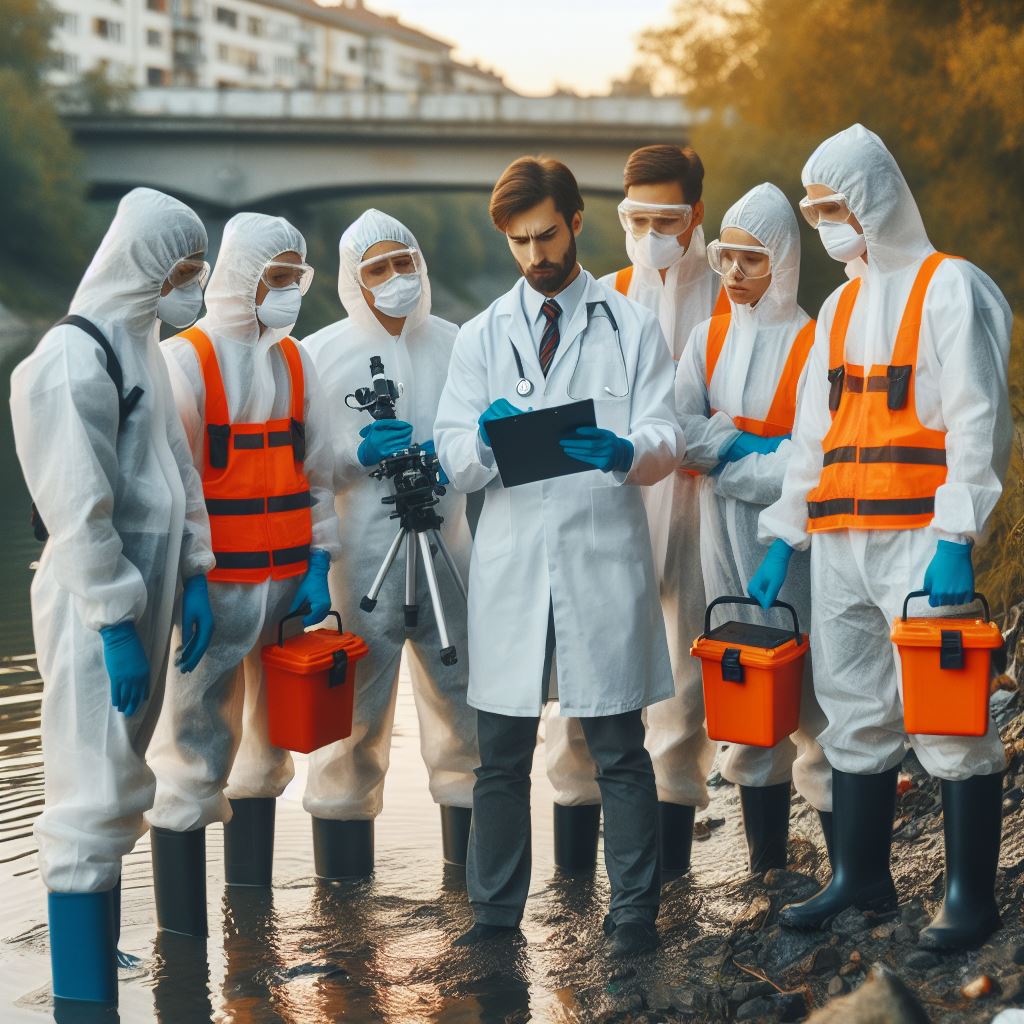Introduction
Environmental scientists play a crucial role in addressing and solving environmental issues in our world today.
By studying the environment and its components, these scientists are able to understand the impact of human activities and develop strategies for sustainable practices.
Environmental scientists require a diverse skill set to address complex ecological challenges.
Analytical proficiency is crucial for interpreting data, conducting environmental assessments, and designing effective strategies.
Strong communication skills facilitate collaboration with diverse stakeholders and the dissemination of findings to the public.
Knowledge of environmental policies and regulations ensures compliance and informs sustainable practices.
Technical skills in GIS, remote sensing, and laboratory techniques enhance the ability to collect and analyze environmental data.
Critical thinking and problem-solving are essential for identifying and addressing ecological issues.
Finally, adaptability and a holistic understanding of interconnected systems contribute to effective environmental stewardship.
In this blog post, we will explore the key skills that every environmental scientist must possess to be effective in their field.
Technical Skills
In addition to the essential foundational skills, environmental scientists also require a set of technical skills to excel in their field.
These skills enable them to effectively analyze data and assess the impact of environmental factors. Let’s take a closer look at some of these technical skills:
Knowledge of Environmental Laws and Regulations
An environmental scientist must have a strong understanding of the various laws and regulations that govern environmental protection and sustainability.
This knowledge allows them to navigate the legal framework and ensure compliance with relevant standards.
Proficiency in Data Collection and Analysis
Data collection and analysis are critical components of environmental science.
Environmental scientists need to be skilled in collecting accurate and reliable data in the field and analyze it using statistical methods.
This allows them to draw meaningful conclusions and make informed decisions.
Familiarity with Geographic Information Systems (GIS)
Geographic Information Systems (GIS) are powerful tools used by environmental scientists to analyze and visualize geospatial data.
Proficiency in using GIS software enables scientists to map environmental features, identify patterns, and make spatially-informed decisions.
Experience in Conducting Environmental Impact Assessments
Environmental impact assessments (EIAs) are crucial in assessing the potential environmental effects of a proposed development project.
Environmental scientists with experience in conducting EIAs can identify potential risks and propose mitigation measures to minimize negative impacts.
Understanding of Environmental Monitoring and Sampling Techniques
Monitoring and sampling are fundamental techniques used by environmental scientists to assess the quality of air, water, soil, and other environmental components.
An understanding of these techniques ensures that accurate and representative data is collected for analysis.
These technical skills are essential for environmental scientists to effectively carry out their work.
By having a solid grasp of environmental laws, proficient data collection and analysis abilities, familiarity with GIS, experience in conducting EIAs, and knowledge of monitoring and sampling techniques, environmental scientists play a critical role in protecting and preserving our environment.
Unlock Your Career Potential
Visualize a clear path to success with our tailored Career Consulting service. Personalized insights in just 1-3 days.
Get StartedResearch and Analytical Skills
A career as an environmental scientist requires a strong foundation in research and analytical skills.
These skills enable scientists to design and implement research projects, analyze data, and draw meaningful conclusions.
Let’s explore some key skills in this area:
Ability to design and implement research projects
Environmental scientists need the ability to plan and execute research projects effectively. They must be able to identify research questions, develop hypotheses, design experiments, and collect data.
Proficiency in statistical analysis and modeling
A solid understanding of statistical analysis is essential for environmental scientists. They must be able to use statistical techniques to analyze data and interpret results.
Additionally, proficiency in modeling allows scientists to simulate and predict environmental processes.
Skill in data interpretation and drawing meaningful conclusions
An environmental scientist must be skilled at interpreting complex data sets and extracting meaningful information.
They need to identify patterns, trends, and relationships in the data to draw accurate conclusions and make informed decisions.
Critical thinking and problem-solving abilities
Critical thinking is crucial for environmental scientists, as they often encounter complex problems that require innovative solutions.
They must be able to analyze information from different perspectives, evaluate evidence, and think critically to address environmental challenges.
Attention to detail and accuracy in data analysis
Environmental scientists must have a strong attention to detail when conducting data analysis.
They need to ensure accuracy in measurements, recording data, and performing calculations to obtain reliable and valid results.
In fact, strong research and analytical skills are essential for environmental scientists.
These skills enable scientists to design and implement research projects, analyze data, and draw meaningful conclusions.
By developing these skills, environmental scientists can effectively contribute to solving complex environmental challenges.
Read: Day in the Life of a Canadian Biologist: An Overview
Communication Skills
Clear and effective written communication
- Environmental scientists must be able to express their ideas clearly and concisely through writing.
- They should have strong grammar and punctuation skills to ensure their messages are understood.
- Written reports and documentation are essential for communicating research findings and recommendations.
Strong verbal communication and presentation skills
- Environmental scientists need to be able to effectively communicate their research and findings verbally.
- They should be able to present complex information in a way that is easily understood by their audience.
- Public speaking and presentation skills are crucial for conferences, meetings, and seminars.
Ability to convey complex scientific information to non-experts
- Environmental scientists often need to explain complex scientific concepts to individuals without a scientific background.
- They must be able to translate technical jargon into everyday language.
- The ability to communicate with non-experts is important for raising awareness and advocating for environmental issues.
Collaboration and teamwork skills
- Environmental scientists often work as part of interdisciplinary teams on research projects.
- They need to be able to collaborate effectively with colleagues from different backgrounds.
- Teamwork skills are important for brainstorming, problem-solving, and achieving common goals.
Interpersonal skills for engaging with stakeholders and clients
- Environmental scientists often interact with various stakeholders, such as government agencies, NGOs, and community members.
- They need to be able to build and maintain relationships with these stakeholders.
- Interpersonal skills are important for understanding their needs and effectively addressing their concerns.
Overall, strong communication skills are essential for environmental scientists to effectively convey their research findings, collaborate with others, and engage with stakeholders to promote environmental conservation and sustainability.
Read: Breaking Into Data Science: Tips for Canadians

Adaptability and Flexibility
Environmental scientists need to possess the key skills of adaptability and flexibility to thrive in their field.
From working in different environments and climates to handling unexpected challenges, these abilities are paramount.
In this section, we will explore the various aspects of adaptability and flexibility that environmental scientists require in their professional lives.
Ability to work in different environments and climates
An environmental scientist’s work often takes them to diverse locations, ranging from remote forests to bustling cities and from freezing tundras to scorching deserts.
It is crucial for them to have the ability to acclimate and work efficiently in various environmental conditions.
Whether it’s conducting research in a rainforest or collecting data in an urban setting, environmental scientists must adapt their methods and approaches based on the specific challenges and characteristics of each environment.
Without this flexibility, the scientific data they collect may not accurately represent the conditions or ecosystems being studied.
Willingness to learn and adapt to new technologies and methods
In the ever-evolving field of environmental science, new technologies and research methodologies are continually being developed.
Environmental scientists must possess a genuine willingness to learn these new technologies and methods and apply them to their work.
By staying up to date with the latest advancements in their field, scientists can enhance the accuracy and efficiency of their work.
This adaptability ensures that their research remains relevant and enables them to tackle environmental issues using the most effective tools available.
Capacity to handle unexpected challenges and changes in projects
Environmental science projects can be complex and unpredictable, often presenting unforeseen challenges and changes.
Scientists must possess the mental fortitude and flexibility to handle these unexpected situations.
Whether it’s a sudden change in research objectives or an unforeseen obstacle in data collection, environmental scientists must have the resilience to adapt their plans and find creative solutions.
The ability to think critically and problem-solve in a dynamic environment is essential to the success of their projects.
Time management and organizational skills
Environmental scientists often juggle multiple tasks and projects simultaneously.
Effective time management and organizational skills are vital to ensure that deadlines are met, data is collected accurately, and research objectives are achieved.
By prioritizing tasks, setting realistic deadlines, and organizing their work efficiently, scientists can optimize their productivity and minimize the chances of errors or oversights.
Being able to manage their time effectively allows environmental scientists to make the most of their resources and deliver high-quality research.
Ability to balance multiple tasks and prioritize effectively
Environmental scientists commonly find themselves handling numerous responsibilities, ranging from fieldwork and data analysis to report writing and project management.
The ability to balance and prioritize these tasks is crucial.
By identifying the critical aspects of their projects and allocating their time and resources accordingly, scientists can ensure that they are making progress towards their research goals.
Prioritization skills also enable them to deliver timely and accurate results, even amidst competing demands and tight deadlines.
Generally, adaptability and flexibility are invaluable skills for environmental scientists.
These abilities allow scientists to work effectively in diverse environments, embrace new technologies, overcome challenges, manage their time, and balance multiple tasks.
By honing these skills, environmental scientists can make a significant impact in the field of environmental science and contribute to solving pressing global issues.
Read: How AI is Shaping Data Science in Canada
Gain More Insights: Lab Safety Protocols: What Every Tech Should Know
You Might Also Like: Lab Technician Salaries Across Canada Compared
Ethical and Professional Conduct
When it comes to ethical and professional conduct, environmental scientists play a crucial role in ensuring the sustainable and responsible management of the environment.
They are expected to have certain key skills and qualities to navigate the complex landscape of ethical considerations and professional obligations.
Commitment to environmental sustainability
A commitment to environmental sustainability is at the heart of every environmental scientist’s work.
This means that they have a deep conviction to preserve and protect the environment for future generations.
They must view their work as a responsibility to the planet and strive to find solutions that promote sustainability.
Knowledge of ethical guidelines and standards in research
Additionally, environmental scientists must possess a thorough knowledge of ethical guidelines and standards in research.
They should be familiar with the principles of integrity, honesty, and transparency that underpin scientific inquiry.
This knowledge helps them design research studies that are ethical and accountable.
Accountability and integrity in scientific work
Accountability and integrity are fundamental in the scientific community. Environmental scientists should take responsibility for their actions and the consequences of their research.
They must be honest in reporting their findings and ensure the reproducibility of their work.
By adhering to these principles, they contribute to the credibility and reliability of scientific knowledge.
Adherence to health and safety regulations
In their work, environmental scientists must also pay close attention to health and safety regulations.
This includes taking necessary precautions to protect themselves, their colleagues, and the environment from potential hazards.
They should be trained in safety protocols and use appropriate protective equipment when conducting fieldwork or working in a laboratory.
Respect for diversity and inclusion in the field
Diversity and inclusion are important values in the field of environmental science.
Environmental scientists should respect and appreciate the diverse perspectives, backgrounds, and experiences that contribute to a more comprehensive understanding of environmental issues.
They should strive to create an inclusive environment where everyone feels valued and respected.
In general, ethical and professional conduct is a critical aspect of the job for environmental scientists.
Their commitment to environmental sustainability, knowledge of ethical guidelines, accountability and integrity in scientific work, adherence to health and safety regulations, and respect for diversity and inclusion contribute to their effectiveness in addressing environmental challenges.
By upholding these key skills, environmental scientists can make a positive impact on the environment and future generations.
Read: Canadian Wildlife Biologists: Roles and Duties
Conclusion
Environmental scientists need a range of key skills to succeed in their profession.
These skills include strong analytical and problem-solving abilities, excellent communication and teamwork skills, as well as a solid understanding of scientific principles and methodologies.
Continuous development and honing of these skills is crucial for professional success in the field.
Environmental science is a complex and ever-evolving discipline, and staying up-to-date with the latest research and advancements is essential.
For individuals aspiring to be environmental scientists, it is important to remember that acquiring these skills takes time and effort.
It requires a combination of formal education, hands-on experience, and a genuine passion for the environment and sustainability.
With dedication and persistence, anyone can develop and excel in these key skills.
Environmental scientists have the unique opportunity to make a positive impact on the planet, by solving environmental problems and driving sustainable solutions.
Therefore, if you are passionate about protecting the environment, consider a career in environmental science.
By continuously improving your skills, you can contribute to a healthier and more sustainable future for generations to come.




